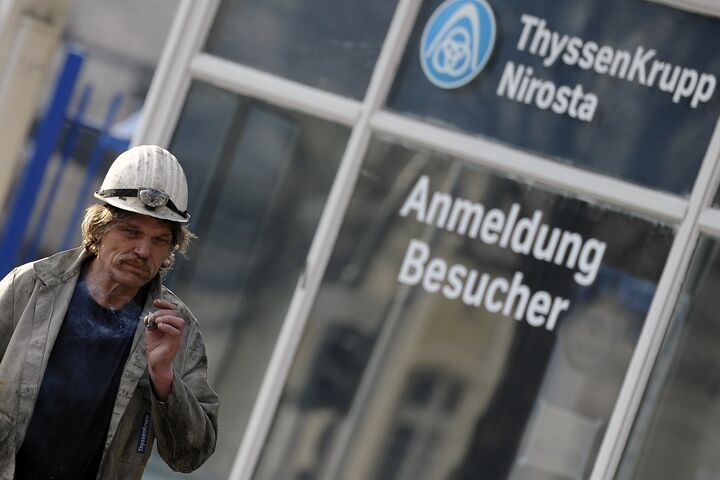
Economic Crisis Beginning to Hurt Germany
Germany was hit with a series of bad economic news last week. On July 23, Moody’s warned that Germany could lose its coveted aaa credit rating over European bailouts. Two days later, it warned that several state- and government-owned banks could be downgraded.
Then, on July 26, several major companies published their quarterly reports—and there was a lot of bad news.
The chemical manufacturing giant basf announced its profits had fallen 16 percent. Daimler’s profits had dropped 11 percent compared to the same period last year. Orders from Siemens had dropped 23 percent. ThyssenKrupp said it would have to reduce hours for 2,000 of its staff due to lack of demand.
“Germany cannot uncouple itself from the weak development of the eurozone,” said an economist from the German Institute for Economic Research, Ferdinand Fichter, as the institute announced that its estimates show that the German economy grew in the second quarter by only 0.3 percent.
“If our neighbors are gradually drowning, at some point Germany will be in deep water too,” warned the Bild tabloid. “But we can’t count on being rescued. We’re the only ones who can help ourselves.”
“For many, it’s an uncomfortable and bitter truth,” it wrote. “But those who thought that Germany would be spared had their eyes closed to reality.”
The news comes as German politicians are becoming increasingly uneasy about Germany’s bailouts to the eurozone.
Moody’s blamed its downgrade warning on the eurozone bailouts, saying that Germany’s rating was in danger due to “the rising uncertainty over the outcome of the euro area debt crisis” and other risks “stemming from the increased likelihood of Greece’s exit from the euro area.” It also cited risks that these countries would be called on to bail out Spain and Italy as reasons for the downgrade.
Some politicians are arguing that the recent news shows that Germany must do more to help the eurozone or else its decline will hurt Germany more. Others are saying that the results prove that Germany must do less to bail out Europe—that the bailouts are beginning to threaten its own economy.
Already, senior German politicians are making unprecedented remarks about Greece leaving the euro. It seems almost certain that Greece will need more money, or to have its bailout conditions relaxed.
Chancellor Angela Merkel’s coalition partners, the Free Democratic Party (fdp), are adamant that cannot happen. German Foreign Minister Guido Westerwelle said “that’s a Rubicon we can’t cross.” German vice chancellor and leader of the fdp Philipp Rösler said that unless Greece stuck to the conditions of its bailout, it would get no more money, adding that “an exit by Greece from the eurozone lost its horror a long time ago.”
The Süddeutsche Zeitung claims that Merkel agrees with her colleagues in the fdp. But politicians from Merkel’s sister party, the Christian Social Union (csu), are going even further.
The csu’s finance minister for the state of Bavaria, Markus Söder, called for Greece to leave the eurozone. Last week, party secretary Alexander Dobrindt said, “With Greece we have reached the end of the road,” and that the country “must get a chance outside the euro.”
Dobrindt even said the eurozone crisis would be the central theme of Germany’s elections next year.
csu chairman and premier of the state of Bavaria Horst Seehofer has even threatened to turn against Merkel over the bailouts. Germany’s contribution to eurozone bailouts is “borderline,” he said.
“The time will come when the Bavarian government and the csu can no longer say yes,” he said in an interview with Stern magazine July 3. “And I wouldn’t then be able to support that personally either.”
“And the coalition has no majority without csu’s seats,” he added.
The csu is the sister party to Merkel’s Christian Democratic Union (cdu). The two parties are almost the same organization. The csu exists only in Bavaria. The cdu does not compete with it, fielding no candidates in Bavaria.
The public seem to support these hardline positions. According to a poll published by Bild am Sonntag, 71 percent of Germans agree that Greece should leave the eurozone if it doesn’t stick to its bailout conditions. Fifty-one percent said Germany would be better off if it left the eurozone itself and returned to the deutsche mark.
There’s a slight downturn in the economy and Germany is already beginning to talk tough. With an election coming up, no party is going to want to be blamed for recklessly spending the nation’s cash on other countries.
This is just the beginning of the euro crises’ impact on German politics. As the crisis worsens, watch for it to destabilize German politics in the same way it has for other countries in the eurozone.
